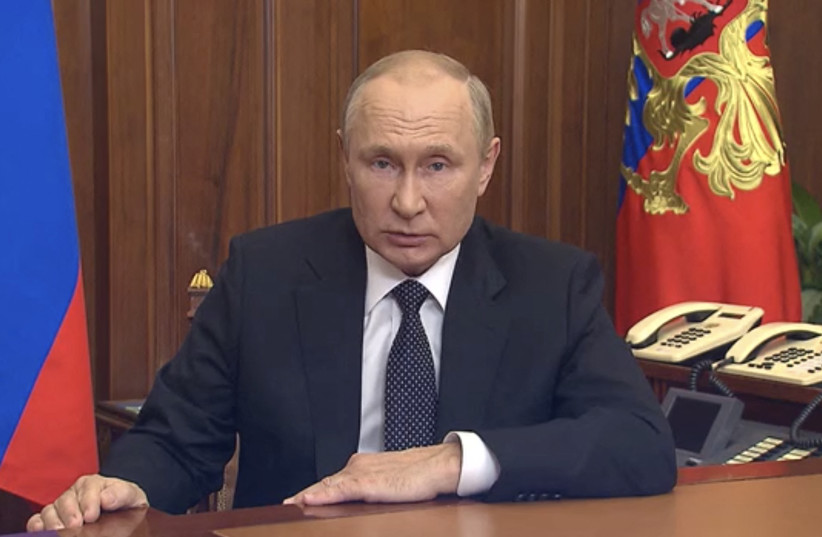Every time Russia faces a setback in Ukraine, or is concerned that western unity might be growing, Russia’s leadership will mention “nuclear” threats. This is a very transparent attempt to manipulate and drive stories in western media.
One way to measure how serious Moscow is about a nuclear threat to the West or Ukraine is to examine whether Russia’s Vladimir Putin or Russian state media pushes this issue into non-western media.
“Days after Russian President Vladimir Putin made a thinly veiled nuclear threat to Ukraine and its Western allies, Russian officials played down the warning," Al-Jazeera noted after the recent announcement about Putin discussing nukes. "On Friday, Sergei Ryabkov, Russia’s deputy foreign minister, said Moscow was not threatening the use of nuclear weapons and that any confrontation with NATO and the United States was not in the Kremlin’s interest.”
Nevertheless, the nuclear story is still dominating headlines. US Secretary of State Antony Blinken warned Russia about nuclear threats.
"We have been very clear with the Russians publicly, as well as privately, to stop the loose talk about nuclear weapons," he noted. This assertion was even reported in Russia’s state media TASS.

Western media
The media is still worried about the nuclear talk in the West. CNN says that Putin’s “tactical nuclear weapons could pack the same punch as atomic bombs dropped on Japan.” The US is “warning” Russia of the consequences of using nuclear weapons. Ukraine’s leader has been quoted saying he doesn’t think Putin is bluffing.
CNBC says that Putin’s threat raises the risk of an “unprecedented disaster.”
The Guardian in the UK says “Putin might use nuclear weapons” and calls on us to plan for this scenario. The BBC says that the EU is concerned that “Putin not bluffing.” The BBC also says the US is taking this seriously.
NBC says that with the nuclear threat “Putin backs himself into a corner.” The Washington Post says we need to “decode Putin’s nuclear warning.” The AP says Putin is cornered and making threats.
The New York Times has an opinion piece asking “how seriously should we take Putin’s nuclear threat.” ABC news in Australia asks what capabilities Putin has.
Outside of western media
The list goes on and on and on and on. However, outside of western media, it doesn’t seem most of the rest of the world is that concerned. That’s not just an issue of proximity. It also has to do with messaging.
It doesn’t seem that Chinese or Turkish media; or major Middle East media outlets are as concerned. This isn’t because these countries think nuclear conflict is acceptable. It appears to be due to the fact that they don’t take this seriously and they apparently don’t need to feed the same news cycle.
Who benefits from Russia mentioning the “nuclear” issue every few months? Clearly, Russia does this every few months to drive a new cycle and to shift the focus on Ukraine to a focus that is all about deterring or talking to Moscow.
The result of the “nuclear” talk is usually two talking points. Either we are told that Moscow feels so threatened by losses that it could be forced to use nukes, or we are told that we need to deter Moscow. Yet Russia’s other partners and friends, like China, Iran and Turkey, don’t seem as concerned.
In some ways, this dovetails with talk about Iran’s nuclear program. The countries that should be concerned don’t seem to be; while the West has often played up the notion that Iran’s nuclear program could result in “war.”
In this scenario, Iran always needs a “deal” to not develop nuclear weapons. Russia may need a “deal” over Ukraine. This is the same logic Moscow appears to hope will work. If it talks up nuclear weapons then it can proceed with the annexation of part of Ukraine and hope to slow down Kyiv’s counter-offensive.
It is worth questioning why Moscow seems to hint at “nuclear” issues every once in a while and then walks back its claims. Is it designed to merely get a response from the West and make it seem the West takes Moscow seriously again; while Russia’s real aims are somewhere else?
Or is it that Moscow truly believes in its own language? Judging from the fact that it seems to downplay the nuclear threat everywhere else in the world, except in dealing with the West; it should be asked whether Moscow is merely bluffing.
